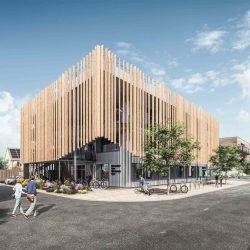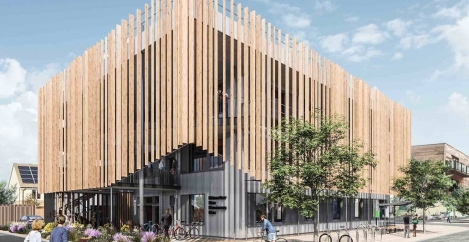August 23, 2017
New eco coworking centre breaks ground in Oxfordshire
 Construction has begun on a new zero carbon business centre at the Elmsbrook development in Bicester, Oxfordshire. PERCH, Elmsbrook is one of two new coworking spaces brought to Bicester by Cherwell District Council (CDC) and is subject to support from European Regional Development Funding. The 1,400 sqm building will span three floors and accommodate up to 125 people. The council claims it will be unique in ‘providing local office space for individuals and small businesses in a highly sustainable building, meeting the standards of the North West Bicester Eco Town’ scheme.
Construction has begun on a new zero carbon business centre at the Elmsbrook development in Bicester, Oxfordshire. PERCH, Elmsbrook is one of two new coworking spaces brought to Bicester by Cherwell District Council (CDC) and is subject to support from European Regional Development Funding. The 1,400 sqm building will span three floors and accommodate up to 125 people. The council claims it will be unique in ‘providing local office space for individuals and small businesses in a highly sustainable building, meeting the standards of the North West Bicester Eco Town’ scheme.
Architect practice Architype who designed the building said: “In synergy with the pioneering Eco Town’s master-plan, the business centre will be exemplar in sustainable architecture and construction and has been designed to achieve a BREEAM Excellent rating.”
Cllr Pratt, Cherwell’s lead member for Estates and the Economy said: “Cherwell is fully committed to investing in new projects that have a strong social, economic and environmental impact. This building has been carefully designed to maximise natural resources, provide a healthy environment, and to be as energy efficient as possible.”
Not only will the building be stylish and considerate in design, but it also goes some way to providing space for new and growing businesses in the district. The co-working space will support people to reach their potential with free business support, and provide the opportunity to network with like minded workers.
PERCH, Elmsbrook sits in a very accessible area where people can travel to work in sustainable ways, either on foot, by bike or public transport, meaning the use of private cars would be reduced.
Ben Ramsay, Operations Director for KIER construction said: “Over the last year we have been working with Cherwell District Council and the team to bring this exciting, innovative facility to this point. Our focus is now to build and integrate the concept seamlessly into the new Bicester Eco Town. We will be engaging with the local community to ensure our construction activities are well communicated and that we create opportunities to contribute back into the area.”
The fabric first approach creates a building that is well insulated to reduce heat loss during the winter, and combining natural and mechanical ventilation maintains thermal comfort and high levels of fresh air throughout the year. Rooftop solar panels will also be installed, and the smart design will help minimise energy and water consumption, claims the council.




















